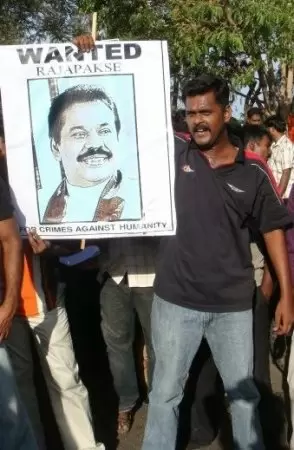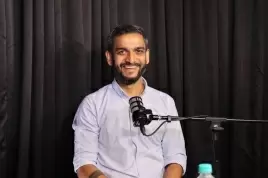Report of the Expert Panel of the UN Secretary General angers Sri Lanka

22-April-2011
Vol 2 | Issue 16
Will a UN report lie? Will an Expert Panel specially set up by the UN Secretary General to examine allegations of war crimes and crimes against humanity be biased, partisan, project half truths and deliberately malign a state?
The questions may be startling to many of us; but to the Government of Sri Lanka, the UN is their current enemy. Just the talk of any of the UN agencies examining allegations of military excesses or war crimes committed by the Lankan army during its war against the LTTE is enough to elicit angry outbursts from Sri Lankan leaders against the world body.
 |
|
Justice delayed: Various UN reports have pointed out serious human rights violations in Sri Lanka, but Mahinda Rajapakse has steered clear of trouble with support from India (Photo courtesy: Save Tamils Movement)
|
What has caused the latest round of vitriol and spitfire is the leaked Report of the Expert Panel of the UN Secretary General. The Report, which was submitted recently, confirmed that the Sri Lankan security forces had indeed committed grave war crimes and crimes against humanity during the last stages of the war against the LTTE in 2008- 2009.
The 3-member Expert Panel found credible evidence of the Sri Lankan war machine having shelled hospitals and `No Fire Zones’, where fleeing Tamil civilians were encouraged to gather. While Sri Lanka officially proclaimed that it would not use heavy weapons and explosives, the Expert Panel concluded that the Sri Lankan forces systematically bombed places of civilian concentration causing deaths of thousands of Tamils.
Apart from using heavy artillery and bombs, the Government of Sri Lanka used a much more potent device to deadly effect: the government and its forces effectively created a blockade around the Vanni region in North Sri Lanka to prevent any flow of humanitarian relief materials from reaching the people. Hospitals without medicines had to conduct amputations without tranquillizers or pain killers; surgeries were conducted under trees as wards were being targeted for bombing.
Acute shortage of water and food killed hundreds more. As the Report noted, the Government deliberately underestimated the number of civilians caught in the conflict zone so as to deprive supply of food, water and medicine supplies.
The Report also highlighted violations of human rights committed by the LTTE including its using civilians as human shields, forced conscription of child soldiers, killing of civilians seeking to flee from their control and forced labour. But as the Report itself notes, during the final months, the LTTE was a depleted force and though the violations were major, that could not be used to justify war excesses committed by the state of Sri Lanka.
Sri Lankan President Mahinda Rajapakse has called upon all patriotic Sri Lankans - to be read as all loyal Sinhalese - to gather in millions on Labour Day, 1st May, 2011, in Colombo to express their resentment at the UN Expert Panel’s Report.
Lost in the din of fury and brimstone is the bitter truth that the Sri Lankan Government cannot hide its record of terror as respected and expert UN bodies have investigated and brought out reports about different aspects of the breakdown of democratic and judicial systems.
The 2008 Reports of the UN Special Rapporteur on Extrajudicial Summary or Arbitrary Executions, Philip Alston, and the UN Special Rapporteur on Torture and other Inhuman, Cruel or Degrading Treatment or Punishment, Manfred Nowak, highlight the systematic way by which rule of law has been replaced with `rule of impunity’ in Sri Lanka.
In particular the Reports highlight how the rogue state is dangerous not because a few `rogue officials’ abuse the law, but because of widespread belief amongst bureaucracy and military that killing and maiming people was as much part of their job to protect their country.
While the Tamils were the general focus of state terrorism, individuals from the majority community who dared to challenge or question the Sri Lankan junta were not spared. Courageous and independent voices who expressed concern over the trampling of democracy, democratic ethics and constitutional norms were exterminated through painful deaths.
Lasantha Wickrathunge, Editor of Sunday Leader was brutally murdered in broad daylight, by paid killers allegedly hired by a Minister of the Sri Lankan government. Till date the killers have not been identified or booked.
On 9th February, 2009, 10 top UN Experts issued a statement sharing the deep concern of the United Nations High Commissioner for Human Rights over the rapidly deteriorating conditions facing civilians in the Vanni region and the significant number of civilian casualties. Importantly they pointed out:
"Notwithstanding the severity of the abuses in areas of conflict, the Experts wish to highlight that the problem is deeper and more endemic. The conflict deflects attention from the impunity which has been allowed to go unabated throughout Sri Lanka. The fear of reprisals against victims and witnesses, together with a lack of effective investigations and prosecutions, has led to a circle of impunity that must be broken. The Experts continue to receive disturbing reports of torture, extra-judicial killings and enforced disappearances throughout the country."
In end May 2009 international human rights groups pressurized the UN Human Rights Council, which was meeting in Geneva to consider a resolution moved by a handful of nations including Germany, US and others to investigate war crimes committed by the Sri Lankan army in the final stages of the war between January - May, 2009.
India, China and some other nations whipped up `third world’ sentiment to block such a move and managed to mobilize support from Cuba, Venezuela and other countries against the conspiracy of `former imperialist nations’ seeking to spread lies about Sri Lanka’s meritorious army victories over separatist Tamils!
Should anyone have any more doubt about the reality that the current Sri Lankan regime has `blood on its hands’?
The UN Expert Panel’s report is at once a call of conscience as also a bugle sound for safeguarding the principal tenets of justice, accountability, democracy and rule of law.
All those who love democracy and cherish human rights should at least now fearlessly stand up and be part of the campaign of global citizens who demand that the killers of thousands of innocent Tamils in the final stages of the war in the period January - May, 2009 are brought to book.
At stake is not a mere legal principle, but the assertion of fundamental principles of democracy and humanity.
V Suresh is President of People’s Union for Civil Liberties (PUCL) – Tamil Nadu & Puducherry
Also Read:
















